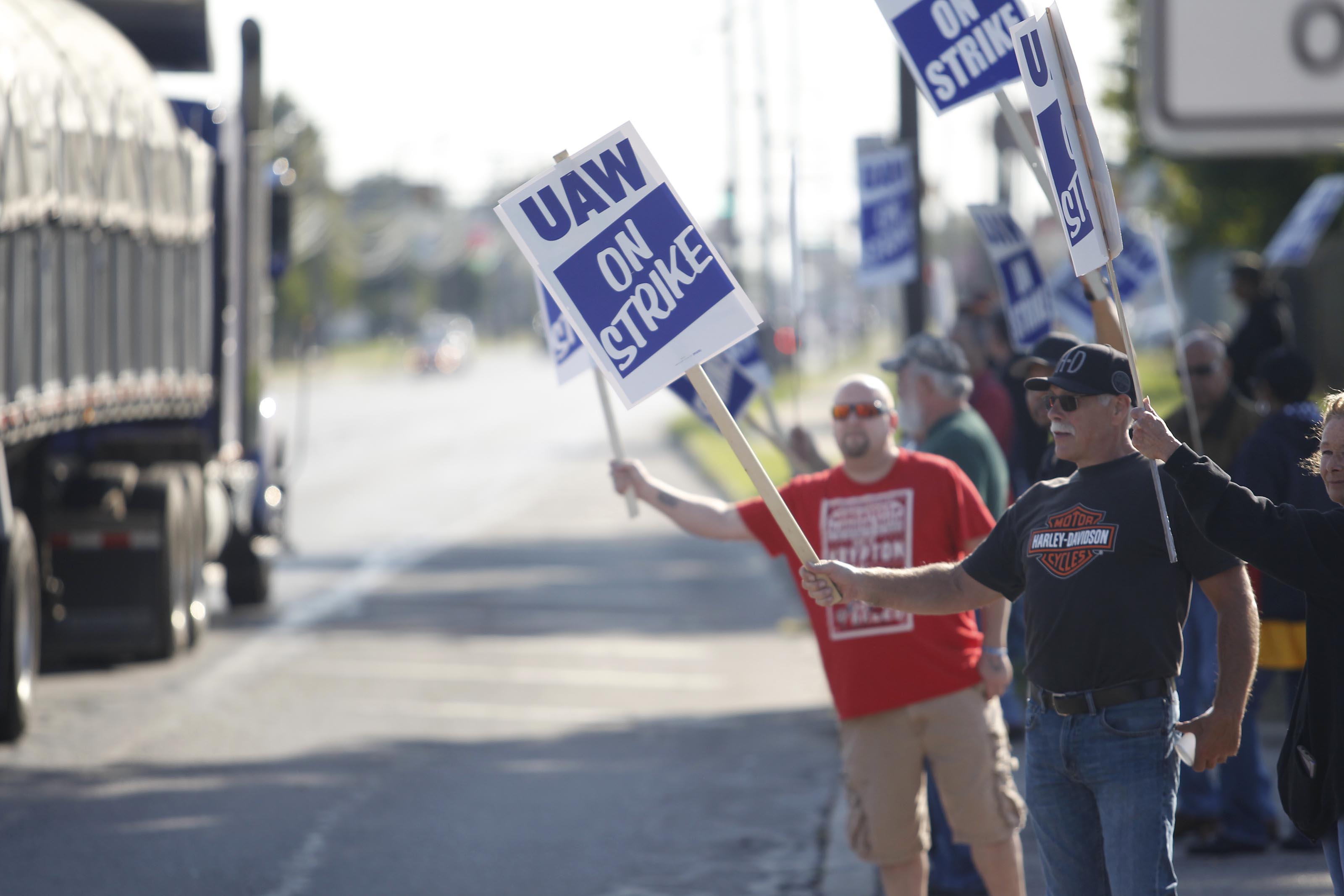The United Auto Workers big GM strike, explained
Thousands of auto workers have walked off the job. Will their protest make waves?

A free daily email with the biggest news stories of the day – and the best features from TheWeek.com
You are now subscribed
Your newsletter sign-up was successful
The smartest insight and analysis, from all perspectives, rounded up from around the web:
Detroit has seen strikes before, but not like this one, said Daniel Howes at The Detroit News. At 11:59 p.m. last Sunday, 46,000 members of the United Auto Workers put down their tools at General Motors plants across the country in the union's first walkout since taxpayers rescued the automaker from bankruptcy a decade ago. What makes this different from other big auto strikes is that the usual union-management tension over wages and the workers' share of GM's $8.1 billion 2018 profit has been overshadowed by "a deepening federal criminal investigation into the union's leadership." Breaking protocol, GM — which could lose $100 million a day from the strike — publicly released a proposal that includes an offer to reopen the shuttered Lordstown, Ohio, plant and retains the UAW's impressive health-care coverage. The automaker is trying to sidestep the union and appeal to the rank and file rather than bargaining with a union president implicated in the investigation of union spending on "golf trips, clothes, cigars, and private villas."
The corruption probe didn't stop Democratic presidential candidates Joe Biden, Bernie Sanders, and Elizabeth Warren from voicing support for the union, said Andrew Duehren at The Wall Street Journal, while President Trump simply called on both sides to reach an agreement. Trump's support from Midwestern manufacturing workers helped him in 2016, but his administration "has taken executive actions that have weakened organized labor." How he handles this strike "could help determine whether he keeps enough blue-collar votes to get a second term."
The Week
Escape your echo chamber. Get the facts behind the news, plus analysis from multiple perspectives.

Sign up for The Week's Free Newsletters
From our morning news briefing to a weekly Good News Newsletter, get the best of The Week delivered directly to your inbox.
From our morning news briefing to a weekly Good News Newsletter, get the best of The Week delivered directly to your inbox.
"Successful strikes beget more strikes," said Steven Greenhouse at The New York Times. The teacher's strike in West Virginia last year inspired statewide walkouts in Oklahoma and Arizona, which then inspired a strike by 7,700 Marriott workers in eight cities, which in turn helped inspire a strike by 30,000 Stop & Shop workers this spring. Each action received strong public support because of "Americans' widespread dismay with wage stagnation and income inequality." Many are equally angry about factories moving overseas despite soaring corporate profits. With "so many workers feeling unfairly squeezed," and labor leaders emboldened, expect more picketing.
Maybe, but large-scale strikes just "don't pack the same economic punch they did in the '90s," said Harriet Torry at The Wall Street Journal. A 54-day strike in 1998 by just 9,200 workers at two parts plants in Flint, Michigan, that shut down GM's production dented the whole nation's economy. These days, though, automakers simply don't matter as much as they used to. A GM strike is probably not "the most effective way to kick off a reborn labor movement," said Noah Smith at Bloomberg. GM now sells more cars and earns more revenue in China than it does in the U.S. The UAW's aggressive demands could render GM uncompetitive in that crucial market. There is also rising anxiety over climate change, and "higher labor costs and pension commitments could make that retooling" for an electric future much more difficult. The UAW's confrontational approach worked in the 1950s, but it could backfire for workers today.
A free daily email with the biggest news stories of the day – and the best features from TheWeek.com
-
 The Olympic timekeepers keeping the Games on track
The Olympic timekeepers keeping the Games on trackUnder the Radar Swiss watchmaking giant Omega has been at the finish line of every Olympic Games for nearly 100 years
-
 Will increasing tensions with Iran boil over into war?
Will increasing tensions with Iran boil over into war?Today’s Big Question President Donald Trump has recently been threatening the country
-
 Corruption: The spy sheikh and the president
Corruption: The spy sheikh and the presidentFeature Trump is at the center of another scandal
-
 The pros and cons of noncompete agreements
The pros and cons of noncompete agreementsThe Explainer The FTC wants to ban companies from binding their employees with noncompete agreements. Who would this benefit, and who would it hurt?
-
 What experts are saying about the economy's surprise contraction
What experts are saying about the economy's surprise contractionThe Explainer The sharpest opinions on the debate from around the web
-
 The death of cities was greatly exaggerated
The death of cities was greatly exaggeratedThe Explainer Why the pandemic predictions about urban flight were wrong
-
 The housing crisis is here
The housing crisis is hereThe Explainer As the pandemic takes its toll, renters face eviction even as buyers are bidding higher
-
 How to be an ally to marginalized coworkers
How to be an ally to marginalized coworkersThe Explainer Show up for your colleagues by showing that you see them and their struggles
-
 What the stock market knows
What the stock market knowsThe Explainer Publicly traded companies are going to wallop small businesses
-
 Can the government save small businesses?
Can the government save small businesses?The Explainer Many are fighting for a fair share of the coronavirus rescue package
-
 How the oil crash could turn into a much bigger economic shock
How the oil crash could turn into a much bigger economic shockThe Explainer This could be a huge problem for the entire economy